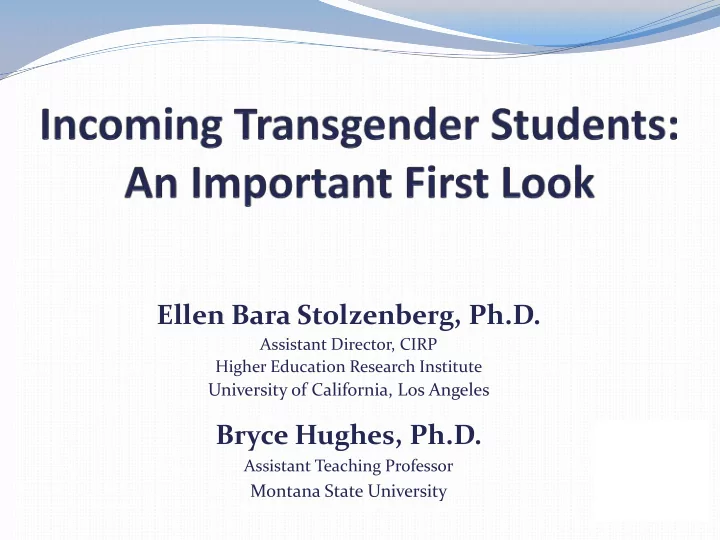

Ellen Bara Stolzenberg, Ph.D. Assistant Director, CIRP Higher Education Research Institute University of California, Los Angeles Bryce Hughes, Ph.D. Assistant Teaching Professor Montana State University
Summary HERI & CIRP Overview CIRP Freshman Survey Sample Select Background Characteristics Finances Emotional Health Political & Civic Engagement Q&A and Discussion
Two Dimensions of HERI Grant- • HHMI • Helmsley Trust Funded • National Institutes of Health Research • National Science Foundation • Annual Student Surveys • Triennial Faculty Survey
CIRP Overview Research-based Questions 50 years of contributing to the research literature Comprehensive Survey Instruments A broad scope allows for shifts of focus not tied to one particular theory but allows for multiple theories as we learn from previous research Comparative Information Benchmark against peers and aspirational groups Longitudinal Design
CIRP Student Surveys* End of 1 st year 2 nd or 3 rd year College entry Senior year College Your First Diverse Freshman Senior College Learning Survey Survey Year Environments (TFS) (DLE) (YFCY) (CSS) *Faculty Survey administered every 3 years
CIRP Freshman Survey Largest and longest running study of higher education in the United States Started by Dr. Alexander Astin at ACE. 1966: First national administration Fall 2015 marked the 50 th administration More than 15 million students Nearly 1,800 institutions
Sample 2015 CIRP Freshman Survey 1 st time students were asked to report their gender identity 678 Transgender students 209 institutions National Sample Weighted data to reflect the nearly 1.5 million first- time, full-time students who started college in Fall 2015. Featured in The American Freshman: National Norms Fall 2015 (Eagan et al, 2015).
Select Background Characteristics 70.0% 58.7% 60.0% 56.5% 53.9% 53.8% 50.0% 50.0% 40.0% 29.5% 30.0% 20.0% 10.0% 0.0% Attending college more than HS GPA of A- or higher Religious preference: 100 miles from home Agnostic, Atheist, or None Transgender Students National Sample
Finances
Financial Background and Expectations 60.0% 56.3% 50.0% 47.2% 40.0% 34.9% 28.5% 30.0% 18.9% 20.0% 12.0% 10.0% 0.0% Parent/Guardian Income 75K Major financial concern Some/Very good chance of or more working full-time while in college Transgender Students National sample
Types of Financial Support 70.0% 60.7% 60.0% 51.6% 47.8% 50.0% 40.0% 36.6% 35.4% 32.8% 30.0% 26.6% 20.9% 20.0% 10.0% 0.0% Work-study Pell Grant Need-based grants or Merit-based grants or scholarships scholarships Transgender Students National sample
Emotional Health
Self-rated Emotional Health Trans nsgend ender er stud uden ents ts 52. 52.1% 24.4% 24. 23. 23.5% Nat ational s sampl ple 12. 12.7% 36. 36.7% 50. 50.6% 0% 10% 0% 20% 0% 30% 0% 40% 0% 50% 0% 60% 0% 70% 0% 80% 0% 90% 0% 100 00% Low owes est 10%/Be Below aver erage Ave verage ge Abo bove average/Highest st 10%
Emotional Well-Being 80.0% 74.6% 70.0% 60.0% 54.9% 47.7% 47.2% 50.0% 40.0% 34.1% 30.0% 20.0% 9.5% 10.0% 0.0% Frequently felt overwhelmed Frequently felt depressed Some/very good chance of by all I had to do seeking personal counseling Transgender students National sample
Time Management 70.0% 60.1% 60.0% 51.8% 50.0% 45.9% 39.7% 40.0% 33.4% 30.0% 26.3% 20.0% 10.0% 0.0% Ability to manage your time Online social networks (6+ Socializing with friends (6+ effectively (Somewhat hours/week) hours/week) strong/Major strength) Transgender students National sample
Political & Civic Engagement
Political Views Transgender Students 69.2% 23.5% 7.3% National Sample 33.5% 44.9% 21.6% 0% 10% 20% 30% 40% 50% 60% 70% 80% 90% 100% Liberal/Far Left Middle-of-the-road Far right/Conservative
Social Agency Transgender Students 17.9% 39.8% 42.3% National Sample 25.6% 45.9% 28.4% 0% 10% 20% 30% 40% 50% 60% 70% 80% 90% 100% Low Average High
Civic Engagement Transgender Students 15.6% 36.9% 47.5% National Sample 28.9% 47.7% 23.4% 0% 10% 20% 30% 40% 50% 60% 70% 80% 90% 100% Low Average High
Political Engagement 80.0% 68.7% 70.0% 60.0% 52.1% 47.4% 50.0% 43.0% 40.0% 33.1% 32.4% 30.0% 20.8% 20.0% 14.5% 10.0% 0.0% Publicly communicated Discussed politics Demonstrated for a cause Likelihood of my opinion about a cause (Frequently) (e.g. boycott, rally, participating in student (Frequently) protest) in the past year protests/demonstrations (Frequently/Occasionally) in college (Some/Very good chance) Transgender Students National Sample
Goals (Very Important/Essential) 70.0% 64.6% 63.3% 60.0% 55.7% 50.0% 43.9% 43.1% 41.2% 40.4% 40.0% 30.0% 22.3% 20.0% 10.0% 0.0% Influencing the Keeping up to date Influencing social Helping to promote political structure with political affairs values racial understanding Transgender Students National Sample
Contact Information Ellen Bara Stolzenberg, PhD Assistant Director, CIRP UCLA Higher Education Research Institute (310) 825-6991 stolzenberg@gseis.ucla.edu
Recommend
More recommend